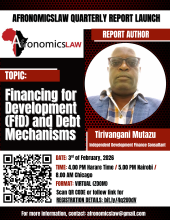Sovereign Debt News Update No. 162: Angola's $1 Billion Total Return Swap: The Hidden Risks of a Silent Deal
In December 2024, Angola stealthily entered into a US$1 billion one-year derivative contract known as a ‘total return swap’ with JP Morgan Securities Plc (“JPM”). The transaction was concluded at a time when Angola’s public debt was approaching 60% of GDP, intensifying scrutiny of non-traditional financing instruments that can generate hidden or contingent liabilities. Uniquely, this agreement unfolded without the usual spectacle of a traditional sovereign financing deal. There was no bond roadshow, no parliamentary debate, and scarcely any press fanfare following the event. This absence of public process meant that neither parliamentary scrutiny nor advance disclosure of potential contingent liabilities accompanied the transaction.

